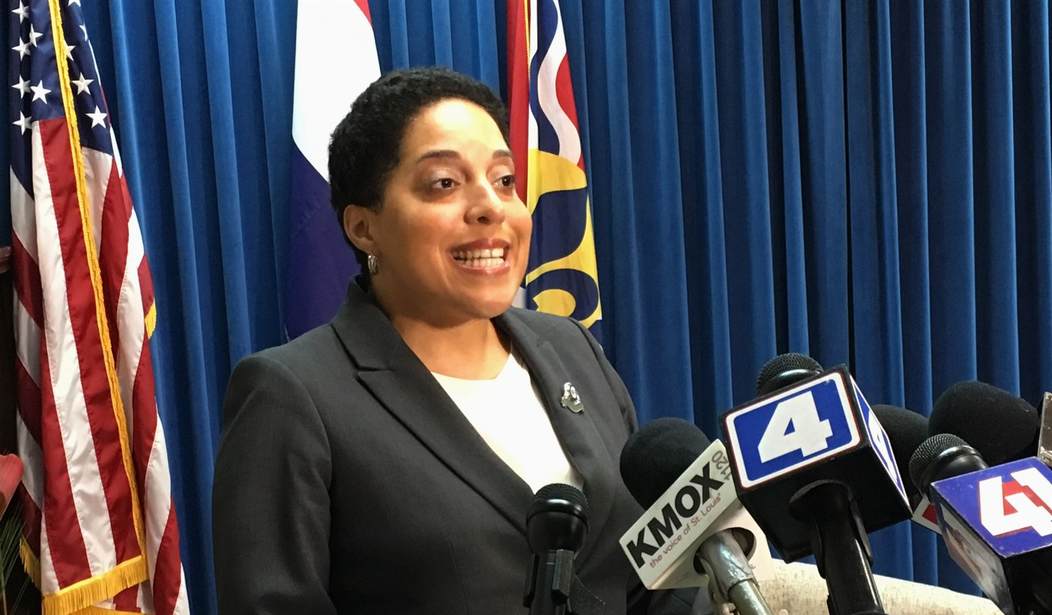As she announced felony charges against the McCloskeys, St. Louis prosecutor Kim Gardner noted something that most people missed: that she was elected to pursue "equal justice."
What exactly is "equal justice," and how is it distinguished from justice?
"Equal justice" is a term used by neoleftist politicians to alert their base of racial disparities in the criminal justice system, with the implication that "racial equity" must be actively pursued. It is most commonly used by Soros-sponsored wolves in prosecutors' clothing. It is a political movement to interject a race consideration component into the criminal justice system. There is even an Equal Justice Initiative organization, a Soros-sponsored group that advertises itself as "committed to ending mass incarceration and excessive punishment in the United States, to challenging racial and economic injustice, and to protecting basic human rights for the most vulnerable people in American society."
But what does race and "ending mass incarceration" have to do with charging a White suburban couple, the McCloskeys? Why was the term "equal justice" relevant in this particular prosecution?
The answer lies in Kim Gardner's implementation of "equal justice" as a whole.
Consider this: Gardner refused to prosecute 80% of the arrests related to looting, property destruction, theft, and rioting during the BLM protests. This is consistent with her lackadaisical approach to the prosecution of serious crime since her election. Last year, she refused to prosecute more than 76% of felony arrests. Why not prosecute serious crime? Because Gardner is implementing "equal justice" as a type of racial justice reparation. But Gardner does not say it straight out; instead, she tells us that she is making these non-prosecution decisions because there was insufficient evidence to move forward with charges.
Recommended
The insufficient evidence argument, however, does not hold water when you apply it to the McCloskeys. The McCloskey case does not have sufficient evidence for a clean-cut prosecution; a middle-aged couple in fear for their safety employed a sound self-defense tactic after an angry mob of trespassers broke into their private community and threatened to harm them and their dogs. And, they only exercised a show of weapons after they called the police and were denied protection. This isn't a cut-and-dry prosection in the least.
It's clear that Kim Gardner is not worried about the sufficiency of the evidence in her decision-making. Gardner is making her decisions on other factors, political and racial ones.
Gardner described the BLM mob that broke down an iron gate to trespass in the McCloskeys' private community as "peaceful, unarmed protesters ... participating in nonviolent protest." By comparison, she describes the McCloskey response as "threatening" and "unacceptable." Mob crime is acceptable, but self-defense is not? Really?
But Kim Gardner explained herself: she was elected to pursue "equal justice." This is why Gardner refused to acknowledge BLM mob criminality, and why Gardner went after the McCloskeys despite a feeble case against them. The McCloskey prosecution is just politics; race politics, to be precise.
Kim Gardner employed the concept of "equal justice" to give a free pass to people who look like those in the past who experienced historic injustice. Gardner then shifted prejudice onto people who looked like the those whom she viewed as receiving favorable treatment in the past.
Kim Gardner simply put her weight on a racial bias see-saw.
"Indeed, [the McCloskey prosecution] is part of a troubling pattern of politically motivated prosecutorial decisions by the St. Louis Circuit Attorney," wrote Senator Josh Hawley to Attorney General Barr. Hawley called for a federal civil rights investigation into Kim Gardner's seemingly discriminatory practices. He concentrated on Second Amendment violations. However, Gardner was presented with plenty of firearms cases after taking office that she chose not to prosecute. She didn't even prosecute a man who confessed to shooting a 7-year-old child. Gardner's decision-making wasn't about trampling on the right to bear arms; it was about who held the arms. "Equal justice."
Kim Gardner needs to be investigated for racially-motivated prosecution.
And, conservatives now need to be on the lookout for neoleftist justice terminology. "Equal justice" is different than plain old justice in that it implies racially and politically-driven decision-making, as opposed to blind justice. Kim Gardner, for one, is implementing "equal justice" as a type of racial justice reparation. Do you think she is the first or the last to do so? Of course not. George Soros has hired many prosecutors to do the same.

























Join the conversation as a VIP Member